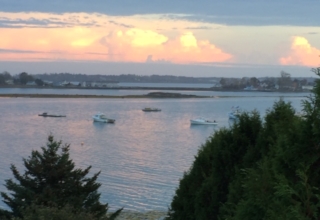
According to the Gergens (2004, p. 21), a constructivist framework: “is . . . likely to favor forms of dialogue out of which new realities and values might emerge. The challenge is not to locate “the one best way but to create the kinds of relationships in which we can collaboratively build our future.” We are not confined to traditional sources of expertise in such a setting (where an appreciative attitude is prevalent), because the relationship and the discourse is itself reality and the primary source of expertise.
Societal Narratives of Our Time: We are often distant from many of the most important events that impact on our lives. We live in a complex, global community and have many connections to a vaster world. Most importantly, we may no longer have direct experience of (nor can we have much influence over) this world. As a result, we often share narratives about things and events rather than actually experiencing them. Language itself becomes the shared experience. This sense of a constructed reality that is reinforced by narrative and conversation is a starting point for dynamic constructivism. The key point with regard to a dynamic constructivism is that each specific conversation is itself a reality.
Shared narratives and language are where we actually meet with other people and our society. More than ever, our work groups and organizations are based on and dependent on these dynamic interpersonal conversations and shifting, context-based narratives. Most people, resources and attention in present-day work groups and organizations are devoted not to the direct production of goods or direct provision of services, but instead to the use of verbal and written modes of communication about these goods and services. Given these conditions, storytelling and narrative are central to 21st century life and form the foundation for collective expertise. Stories are the lifeblood and source of system maintenance in both personal and organizational lives. The construction of stories about person, group and organizational successes and failures is critical to the processes of change and transformation at any of these three levels. It is in the stories that expertise is most effectively shared in a compelling (and authentic) manner.
A Vision of the Future
We have dwelt on the nature of dynamic constructivism because it plays a central role in the creation of a shared attitude regarding the purpose for and desired destination of collective expertise. Why, in other words, are we willing to work together and find “reality” within the sharing of diverse perspectives. This is hard, demanding interpersonal work—why do we do it. This engagement in collaboration and the building of collective expertise requires the accompanying construction of a compelling and guiding vision of the future. Communities of heart are sustained by just such a vision.
Put simply, collaborative expertise is guided by and motivated by an articulate vision of the future that is persuasive and motivating. Expertise is brought forth and accepted because people are “hungry” for a dream or image of a better world that is saturated with justice, equity and prosperity.
The Nature of Visionary Leadership: Visionary leaders like Abraham Lincoln often were born in poverty and are self-taught—the mantle of expertise did not come “naturally” to them. Other visionary leaders such as Susan B. Anthony (and the other Seneca Falls advocates for women’s rights) and Martin Luther King (and the other civil rights leaders of the 1960s) grew up in a world that discriminated against the expertise that they have to offer (or at least against the expertise offered by people who are “not of their kind”).
Download Article














